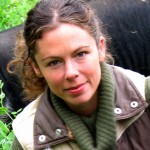Upcoming Webinar: Mobile Abattoirs
Posted: October 17, 2012
Categories: Events / Food Processing / GoodFoodBites / Local Procurement / The Meat Press / Webinars
Join us on October 30th for a lively discussion about local meat in Ontario!
![]() The topic is “Mobile Abattoirs” – literally, slaughterhouses on wheels! – which some say could bring more meat processing capacity to rural Ontario, and thus improve access to local meat around the province. What do you think? Join in on the conversation on Tuesday, October 30, from 12 noon – 2 p.m.
The topic is “Mobile Abattoirs” – literally, slaughterhouses on wheels! – which some say could bring more meat processing capacity to rural Ontario, and thus improve access to local meat around the province. What do you think? Join in on the conversation on Tuesday, October 30, from 12 noon – 2 p.m.
In many parts of Ontario, livestock farmers and butchers alike are struggling to keep their businesses going. Some farmers can’t find nearby abattoirs to take their animals to for processing, while some butchers and abattoir operators struggle to bring in enough income to stay ahead of the high costs of increasingly strict regulations. In fact, as a result of these constraints and others, the number of small processors operating in Ontario has dropped by 40% since 1991 (see Maureen Carter-Whitney’s 2008 publication, “Bringing food Home: Legal, Regulatory and Institutional Barriers to Local Food”.)
It can be easy to forget how important butchers are in local food systems, but the truth is that small farmers really need local processors in order to get their healthy, ethically-grown meat to the people who want to eat it! Demand for organic and/or local meat is on the rise, especially in the wake of the disturbing news of beef recalls and food safety issues in some of the large-scale meat processing plants in the country. Unfortunately, the infrastructure that farmers need to keep producing local meat is disappearing…
So, we’ve set out to bring together a collection of voices to speak to one proposed solution: the mobile abattoir. These “processors-on-wheels” already operate in parts of BC and Alberta, as well as in several states in the US, and we’re interested in hearing opinions about their applicability in Ontario. Many say that they can be viable businesses that make sense for many reasons, not least of which is the fact that animals avoid the stressful journey from farm to slaughterhouse. How well do these abattoirs serve small farmers? Are they viable businesses? Can they be made to work with existing food safety laws? How would they affect other butchers/processors in Ontario? What are the relevant differences between poultry and large animal abattoirs?
Come be part of the discussion! Our panel will be made up of farmers, processors, and those involved in agricultural policy making in BC, Alberta and Ontario. Each person will speak from their experiences and you’ll have the opportunity to ask questions. Let’s consider this idea and whether it has promise in our province! The webinar will be held on Tuesday, October 30, 12 noon – 2 p.m. It’s easy and free to participate!
Meet Our Panelists
Kathleen Gibson
Kathleen is a Principal of GBH Consulting Group Ltd. and a food systems specialist and policy analyst based in Victoria, BC. She has worked for BC farmers and now develops and works on sustainable agriculture and food security projects locally, provincially and nationally.
From March 2005 to January 2012, Kathleen worked on contract to the BC Food Processors Association on two programs related to implementation of the Meat Inspection Regulation (MIR) under BC’s Food Safety Act. The MIR requires all who slaughter animals for sale of meat for human consumption in BC to hold a licence. One of the BCFPA programs focused on assisting slaughterhouse operators towards licensing and the other provided funding to licencees to help defray related capital costs. From 2005-2008 Kathleen coordinated the licensing team; from 2008-2011 she managed both programs.
Over the period of her involvement with the “meat file” in BC, 40 facilities received A or B operating licences (and two new classes of slaughterhouse licence were introduced). Slaughterhouses may serve red meat, poultry or both, and they may be fixed or mobile. In the course of working with about 15 mobile proponents, some of whom received A or B licences, the licensing team learned a lot about issues related to mobiles’ design, development and operation.
Jodi Koberinski (moderator)
Jodi is the Executive Director of the Organic Council of Ontario. Jodi was a founding director of the Boundary Farm to Table Society (1999-2003) and a founding director of the BC Food Systems Network (1999-2005). She was the Program Coordinator for AgraRoots, a project that established farmers’ network in the Boundary region of BC. She was a member of the Small Scale Food Processors Association in BC until 2005, and served as Director for Certified Organic Associations of BC. She has experience with research and development, certification, organic sourcing, marketing, and business planning.
Cory Van Gronigen
The Van Groningens raise 400 beef cows and replacements on 475 acres in Haldimand and Norfolk Counties. Between themselves, Cory’s parents and three of Cory’s brothers, the operation consists of two different farm locations, an abattoir and two retail stores.
Through involvement in associations such as the Haldimand Cattlemen’s Association and the Ontario Independent Meat Processors, the Van Groningens are continually on the leading edge of developments in the beef and meat industry. They also make an effort to do research on their farms, all with the goal of producing the best quality beef. Cory and his brothers are also actively looking at ways to get locally produced foods into public sector institutions. Cory and his wife Heidi were awarded Ontario’s Outstanding Young Farmers Award this year.
(bio credit: http://www.oyfontario.ca/)
Bert Dening
Bert farms with his family north of Barrhead, Albera, as well as working for Alberta Agriculture. On their farm they run Bison Beef cattle, chickens and hogs, selling meat and eggs at 4 farmers markets and to local clients. Bert has spent most of his career as a swine specialist, and for the last 7 years he has worked mainly with small scale livestock producers who direct market their meat.
He has been working closely with Olds College since 2007 on their mobile abattoir project. They built a red meat abattoir first (2007-08). Bert was involved in all aspects of the project and in 2008, they slaughtered over 170 animals including bison, beef, hogs, deer and sheep. The report is on the Olds college web site. He was also involved in the next stage of the project, which was to test out a mobile poultry slaughter plant, which took place during the summer of 2011. This plant worked very well and could slaughter up to 750 birds a day. He coordinated this project, from driving the truck to participating in / supervising each slaughter, as well as writing the report.
Tarrah Young
 Tarrah Young runs Green Being Farm in Neustadt, ON with her husband Nathan Carey. They run a winter CSA, supplying their members with high quality storage crops and hardy greens along with a healthy dose of food and farm education. They also raise and direct market pastured pork, poultry, grassfed lamb, beef and eggs, with a focus on raising animals in a way that does not compromise their dignity of that of the environment.
Tarrah Young runs Green Being Farm in Neustadt, ON with her husband Nathan Carey. They run a winter CSA, supplying their members with high quality storage crops and hardy greens along with a healthy dose of food and farm education. They also raise and direct market pastured pork, poultry, grassfed lamb, beef and eggs, with a focus on raising animals in a way that does not compromise their dignity of that of the environment.
Tarrah holds a degree in Environmental Biology from the University of Guelph, and acts an instructor for both FarmStart and Georgian College, where she teaches both aspiring and existing farmers. She also runs seminars for consumers designed to help them understand better understand farming and food systems.
Freeman Boyd
Freeman has lived and farmed in Grey County for 25 years. He operated a market garden and egg/poultry farm near Walter’s Falls throughout that time, taking his product to the Owen’s Sound farmers’ market. He has a PhD in Agricultural Ethics from the Philosophy Department at Guelph, where he also taught for 10 years, during the winters, while he farmed in the summers. More recently, he worked as the Local Food Project Coordinator in Grey/Bruce counties (http://www.foodlinkgreybruce.com). He also has a broad interest in natural history and was President of the Owen Sound Field Naturalists twice and now sits on the board of Ontario Nature.
Amy Proulx
Dr. Amy Proulx is Professor and Coordinator of the Culinary Innovation and Food Technology Program at Niagara College, and Research Leader for the Canadian Food and Wine Institute Research Centre at Niagara College. Her research interests focus on developing technology solutions for small and medium sized food businesses and startups. Prior to joining Niagara College, Amy was Food Processing Specialist and Inspector for the Canadian Food Inspection Agency – Toronto Region, where she worked in the Meat Hygiene Program. She has also worked for Agriculture and Agrifood Canada, and the USDA.



